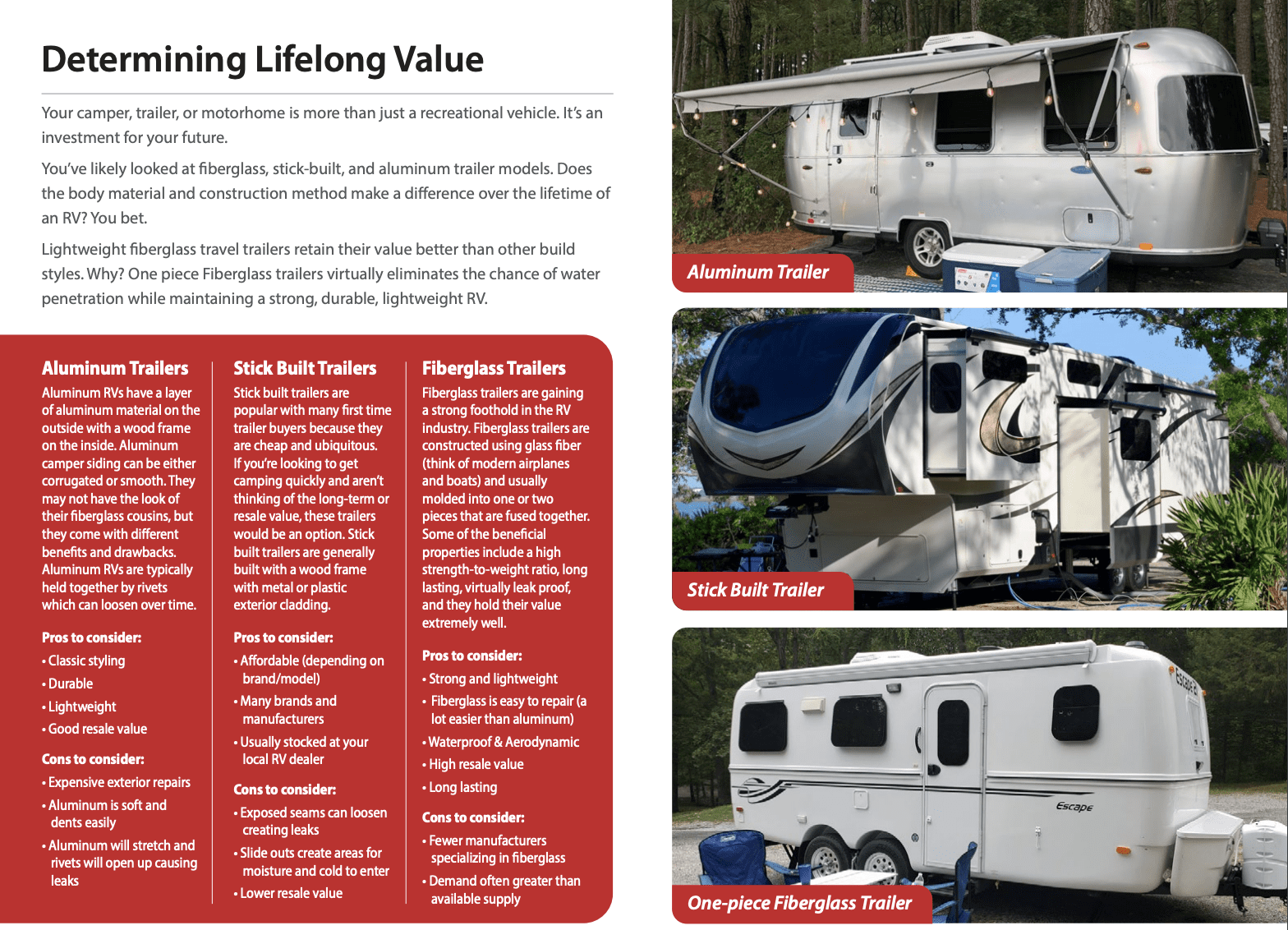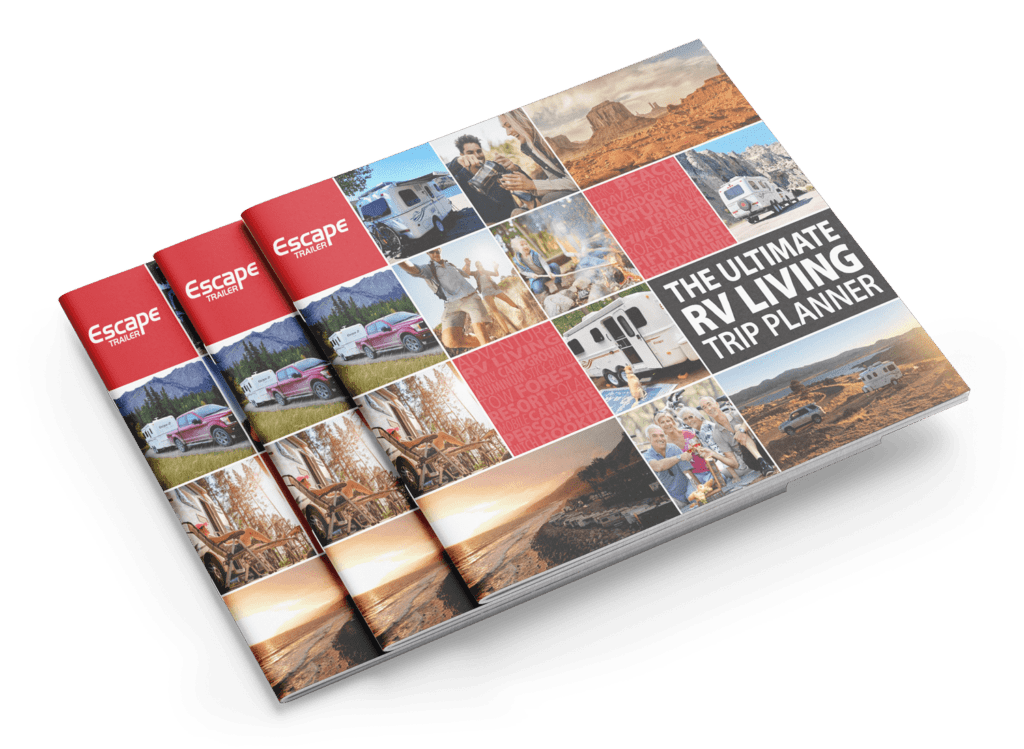The Ultimate RV Living Trip Planner
AN INTRODUCTION TO THE ULTIMATE RV LIVING TRIP PLANNER
Life in the ‘Escape’ lane. It’s your time to adventure and leave the bustle of life behind you. This RV guide has great tips on how to choose the best RV and prepare for a memorable experience. Prepare for adventure. Prepare for fun. Prepare to Escape.
Download PDF of the RV Living Tip Planner Guide
Choosing the Right Travel Trailer for Your Adventure
Personalization: Design Your Escape from the Start vs Re-Doing a Pre-owned RV to Fit Your Style
With a personalized RV trailer, you get all you need and want.
A common misconception about custom travel trailers is that they’re too expensive for the average RVer. This is not true, in fact many custom trailer manufacturers are now direct to consumer and by removing the dealership they can give you the maximum bang for your buck.
If you are curious about how much a custom travel trailer will cost, you can gain much-needed insight by chatting with one of the direct to consumer RV manufacturers like Escape Trailer or visit their website. Escape is one of those manufacturers with a transparent process for pricing, they also have a unique following with customers willing to show off their trailer and give objective feedback to folks like yourself.
When designing your home-away-from home, keep in mind your motivation for hitting the road. As you tailor your RV, it will become your haven from city life or Zen escape on wheels. Furthermore, when you personalize your camper, you can design your travel trailer to meet your needs and have all the nooks, crannies, and design features to make your life on the road the best it can possibly be.
Retrofitting a trailer or RV can be a more affordable option if you have cash-onhand and the skills to make it your own. Yet it can also be a laborious project with hiccups along the way with difficulties that can be hard to foresee. A simple update to an existing trailer can cost as little as $2,500, but larger overhauls will cause that number to multiply.
You may find that a direct to consumer trailer manufacturer will have a price that is hard to beat. Personalization from the get-go ensures that your home on the road is exactly what you need and what you want, allowing you and your family to jump into RV life knowing what to expect and the safeguard that your RV will be the comfortable retreat you envisioned. Direct to consumer manufacturers with a customer centric approach focus on making the product fit your needs, and because they work directly with the public they are acutely aware of changing trends and new styles. They are also more in touch with customer requirements and what works or doesn’t work when you are on the road.
Which Choice is a Better Fit for Your Schedule?
If you’re itching to begin your adventure, designing an affordable, customized travel trailer may be the best way to go. When you design a personalized RV, you will receive a time estimate for how long your build will take. While your dream trailer is being built, you can go about your day-to-day life as usual or even rent a trailer for a trip or two in the meantime. Fixing up an existing trailer requires a lot of your time. Most renovations wind up taking more time than most people allot for, and they often cost more. Even if you’re paying someone to design and retrofit it for you, they will want your input along the way
After-Sale Value Consider your trailer’s after-sale value.
While it may seem like a lifetime away (and the farthest thing from your mind right now), anticipating your trailer’s resale potential gives you insight into your future finances. A trailer that retains its value is a better long-term investment. Another thing to consider is that RV’ing is not for everyone, but you have to try it out to know for sure. Buying a trailer with great resale value makes good financial sense. Pre-owned fiberglass trailers typically sell for close to the cost the owners paid for them. Explore the Escape Pre-Owned Escape Trailer page
Customer Service: The Support and Insight You Expect
It can be difficult to differentiate between a company that is “customer centric” versus “product centric”. Customer centric companies focus on you, they want to be very close to you and generally will follow you through the entire purchasing process.
Product Centric companies focus on their product, specifically, you get what they give you and they focus more on dealers and distributors rather than dealing direct with you. Non-commission-based sales teams can be a sign that the company cares more about customer satisfaction than pushing sales.
Transparency in procedures and information are also great indicators of honest practices and prices. Superior customer care should include after the sale support. Should you have questions about your RV after you purchase it, you want to find answers easily.
You don’t want to waste time being pushed through a phone tree or transferred back and forth between departments. You also want to work with a team that will patiently and thoroughly explain any information you may need. When it comes to customer service, the Escape Trailer team is invested in your satisfaction. Our friendly, caring team of non-commission salespeople and configuration specialists know our products inside-and-out.
We also take pride in being transparent about our processes and information. We feel it’s important to make an informed decision and fully understand every aspect behind the trailer you will call your own. Purchasing an RV is a major investment. We’ve been living, breathing, and building the best travel trailers since 1993. If you have questions—we have answers. Whether your Escape Trailer is your first RV or fifth, we will make sure every aspect of your camper will make your adventure the best it can be.
What to Expect from Life on the Road
Living Where You Want: Choosing the Ideal Setting
Why have you decided to hit the road and embrace the adventure and excitement of living your dream out of a travel trailer? Whether you’re looking to reconnect with nature, simplify and focus on what matters most, or ditch your mortgage and go tiny, planning and preparation are key to ensuring your priorities are protected.
One of the first decisions you will want to make is where you want to live. Luckily, when you’re mobile, there are endless possibilities and places to explore. No matter where you wind up, your trailer will be your home-sweet-home. Your view may change. Your front yard, backyard, and neighbors may change, but you can always count on the comfort of your home on wheels.
So, what are your options when it comes to where you live?
1. Campsites
Public camping is an affordable and fun way to explore the country. Many publicly owned campsites have convenient accommodations, and most are extremely affordable. Camp fees and length of stay allowances vary. When it comes to U.S. National Parks, some of the least expensive are about $10 per night—the most pricey can be over $90 per night.
- One of the most obvious options for places to park is at campgrounds within public parks and forests.
- The U.S. Forest Service has over 4,000 RV campgrounds that allow RV camping—and even more if you plan on boondocking.
- The U.S. National Park Service and Canada Parks also have hundreds of breathtaking sites to choose from, as well. • Local municipalities, including states, provinces, counties, parishes, and cities often have parks with public RV accommodations.
2. RV Parks, Camps, and Resorts
Across North America, you will find welcoming, comfortable, and safe RV parks that are privately run. Their prices often vary based on their location and amenities.
- RV Parks in lower demand locations with simple accommodations average $30 per night.
- Sites in parks located in moderatedemand areas are about $50 per night.
- Luxury RV resorts are usually $90 or more per night.
3. Off-Road & Boondocking
If you’re truly looking to escape and disconnect, you can try off-road RV camping and boondocking. These options are often the most affordable and the closest equivalent to primitive tent camping. Campendium’s list of free campsites is a great start to finding places to choose from.
4. Rented Land
If you’re looking for unique sites or have a location in mind that isn’t as close to an RV camp as you would like it to be, you can try renting a campsite from a private owner. Here are some of the most common platforms where landowners can link up with RVers looking for prime locations at affordable prices: •
- Hipcamp: This platform has a ton of landowners with amazing locations and great attitudes.
- Tentrr: Slightly less active than Hippcamp, but still has plenty of great sites.
- Airbnb: To find RV sites on Airbnb, select your location and dates then search. Then you will want to filter your results to “Camper/RV” under “Unique Stays.”
- RVparking.com: A great resource for private RV parks.
- BoondockersWelcome.com: Free Overnight RV parking on private property
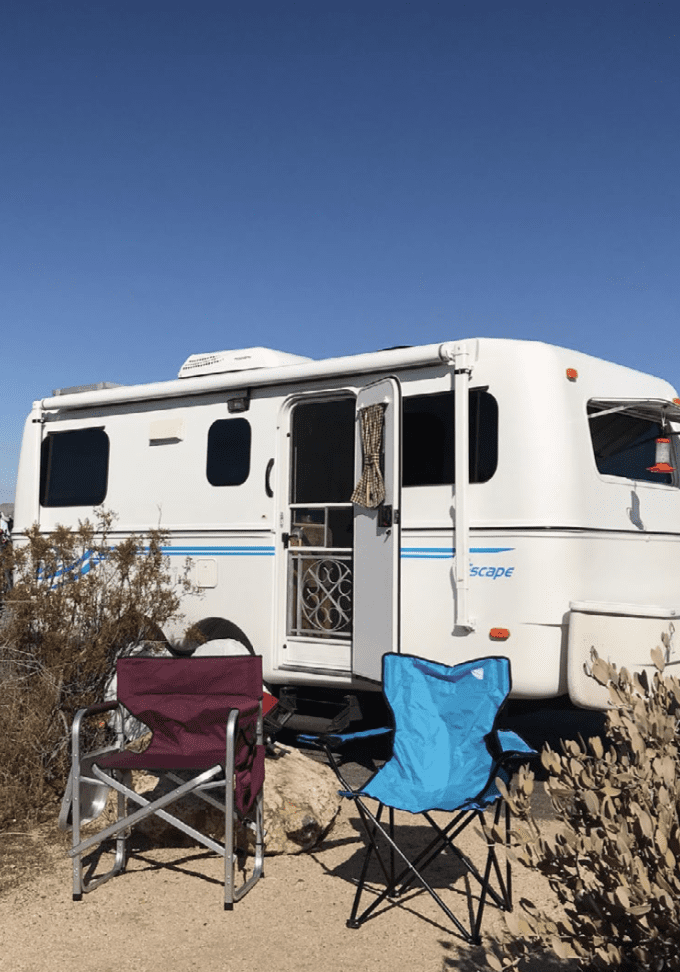
What Will You Need to Make the Most of Each of These Options?
- Many private and public RV parks provide a picnic table. Some will also have fire rings. You may want to add a few more comforts like chairs, lighting, and fans.
- Boondocking requires that you bring in all of your own supplies.
- Privately owned land rentals can vary quite a bit, so be sure to clarify what a site has or does not have before you book.
What should you consider before deciding?
When narrowing down where you want to throw the anchor, you can preview the location to make a better-informed choice.
First, you will want to check out existing reviews. Look for positive and negative patterns of comments. For example, If several reviewers mention “Showers are not clean,” then this issue is likely not a one-time issue.
Next, if you’re planning a longer stay, consider taking a tour. Ask to see the laundry facilities, pool, the available sites, and other common grounds.
Whether you’re on the road and do not have the opportunity to tour or you are considering if touring is worth your time, you can always ask questions. Here are some of the most important questions to ask:
- How much does a standard site cost?
- Are there additional fees?
- What comes with the price of the site? (Electrical, sewer, a grill, a table, a fire ring, etc.)
- Are there pull-through and back-in sites available?
- Is your RV park pet-friendly? If so, are their weight, breed, or number restrictions?
- Are there quiet hours?
- Are there length restrictions or discounts for longer stays?
After you’ve gathered all your information, you will need to weigh your options. Budget is often one of the biggest factors for most, although, for those traveling with pets, the campground’s pet rules can make or break your stay.
No matter what location you choose, be sure to take notes about what you liked or disliked to make choosing your next spot even easier.
One of the most freeing factors of RV living is you can decide how much you will spend. You don’t have to break the bank to have some of the best times of your life. Yet you can also pamper yourself and enjoy more resort amenities if you choose to.
What to Expect Living Year-Round at RV Parks
Living at an RV Park is a more permanent way of enjoying RV life. Yet you have the benefit of being able to pull your anchor and set sail should you feel the need to move on or simply want a change in scenery.
RV parks are filled with others in love with wanderlust and a penchant for savings. So, you can anticipate some permanent residents to the RV park and others that will come and go. You will meet people from all walks of life. If you’re expecting crickets, songbirds, and peace and quiet, you may be surprised to find families with children living life to the fullest.
Some RV parks have age minimums. These often appeal to retirees looking for peace and quiet, along with comradery.
What to Bring for Your Journey
Think about what you would want in a home setting. Bring it but at a smaller capacity: fewer outfits, fewer pots and pans, fewer books. You can always get a library card, and make room for a few larger items. Touches of home will really help you and your family settle in. Potted plants are one of those touches.
Making Your Escape the Best Time of Your Life
Planning and Budgeting for Your Adventures
Financial Stability Is A Must
Life on the road full-time can be a great way to break free of the financial burdens of traditional life, but getting to that point also takes planning. Having a handle on your financial state allows the freedom of the road to fully take effect.
Visiting a financial planner can help you decide how to handle your bills and RV purchase. Deciding on a budget for your RV will be one of the most important decisions you make. You will also want to consider your travel trailer’s resale value for your long-term financial stability.
If you’re planning to downsize and live in your RV full-time, you will likely save a great deal of money, but adding an RV to your possessions may spread your monthly budget too thin.
Budgeting Your Adventures
Life beyond the cul-de-sac can be difficult to imagine without experiencing it. This leaves many potential RVers feeling uncertain. If you’ve been wondering how to budget for your trip, we’ve broken down the biggest expenses you will incur.
How much does RV Living Cost?
The largest expense you will incur is the cost of your camper.
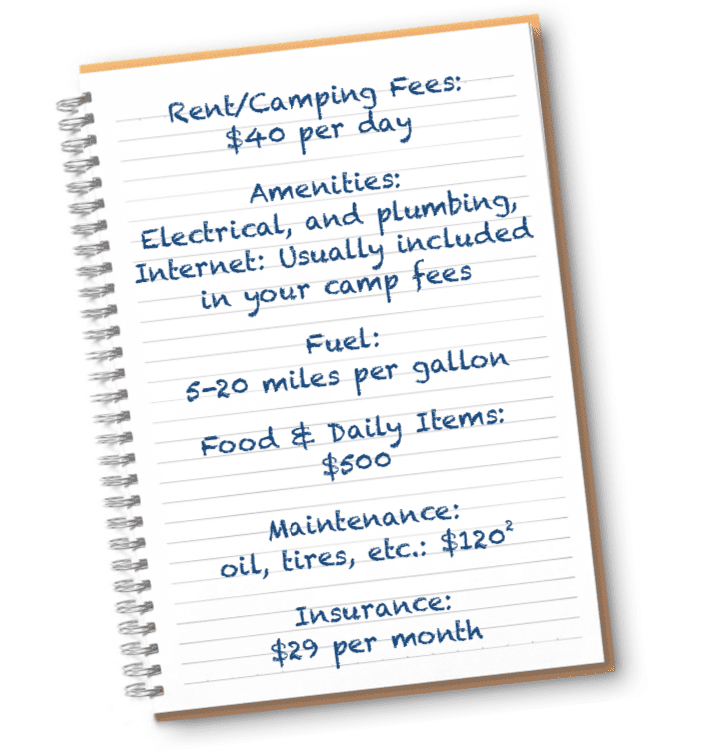
Earning an Income on the Road
Adventure and exploring full-time doesn’t mean you cannot earn an income. Working remotely has become more popular than ever, so keep an eye out for remote jobs in your existing field. Other ways to bring in some green while enjoying the freedom of life on the road include:
- Content Writing: Great for those
who have insight into unique niches like mechanics, real estate, and cooking. - Local Jobs: Don’t be shy about asking around. Local jobs are an excellent way to meet locals, make friends, and learn more about the area.
- Freelancing:If you have a skill like building websites, programming, map making, or photography, you can earn money as a freelancer.
- Teaching or Tutoring Remotely: One of the most popular ways to earn some money teaching on the road is to tutor students remotely abroad. You can also look into adjuncting for college if you have an advanced degree or on-hands career experience—many technical schools hire retirees. If you enjoy working with younger students, most school districts have a shortage of substitute teachers. These gigs often give you the flexibility of making your own schedule, so you still have time for adventure.
- Dog Walking: Get some exercise and enjoy some four-legged fun by walking dogs. Check out Rover or Wag for opportunities.
- Campground Host or other Grounds Jobs: Invest in your campground by pitching in—you can get a discounted or free rent or income. Workamper News or Worker on Wheels are two great places to start your search.
- Sell Your Arts, Crafts, and Photography: Shopify is a great way to print your photography on-demand or sell other artisan products.
- Escape Trailer’s Ambassador Program: Show off all the aspects you love about your Escape Trailer.
Meet the Escapers
Escape owners Gio and Dominique are truly “Living the Dream”. After purchasing a brand new Escape 17B in the Spring of 2020 and including their trailer in their wedding celebration, they headed off to live full-time on the road.
While touring the country, Gio is running his new fully virtual accounting business. For Gio, a typical business day might involve a few online meetings and responding to emails before heading out for a hike or to explore a nearby town. Gio says, “Living full-time and running my business with Dominique is really rewarding. We can work when it is most convenient for us and clients love the ease of the online experience. I am currently working with my partner to grow the business so that Dominique and I can cover our living expenses over the next few years while we travel.”
Dominique and Gio are proving you can live and work on the road. To learn more about their journey, follow their blog at www.experiencebaggers.com and you can connect to their social channels from there
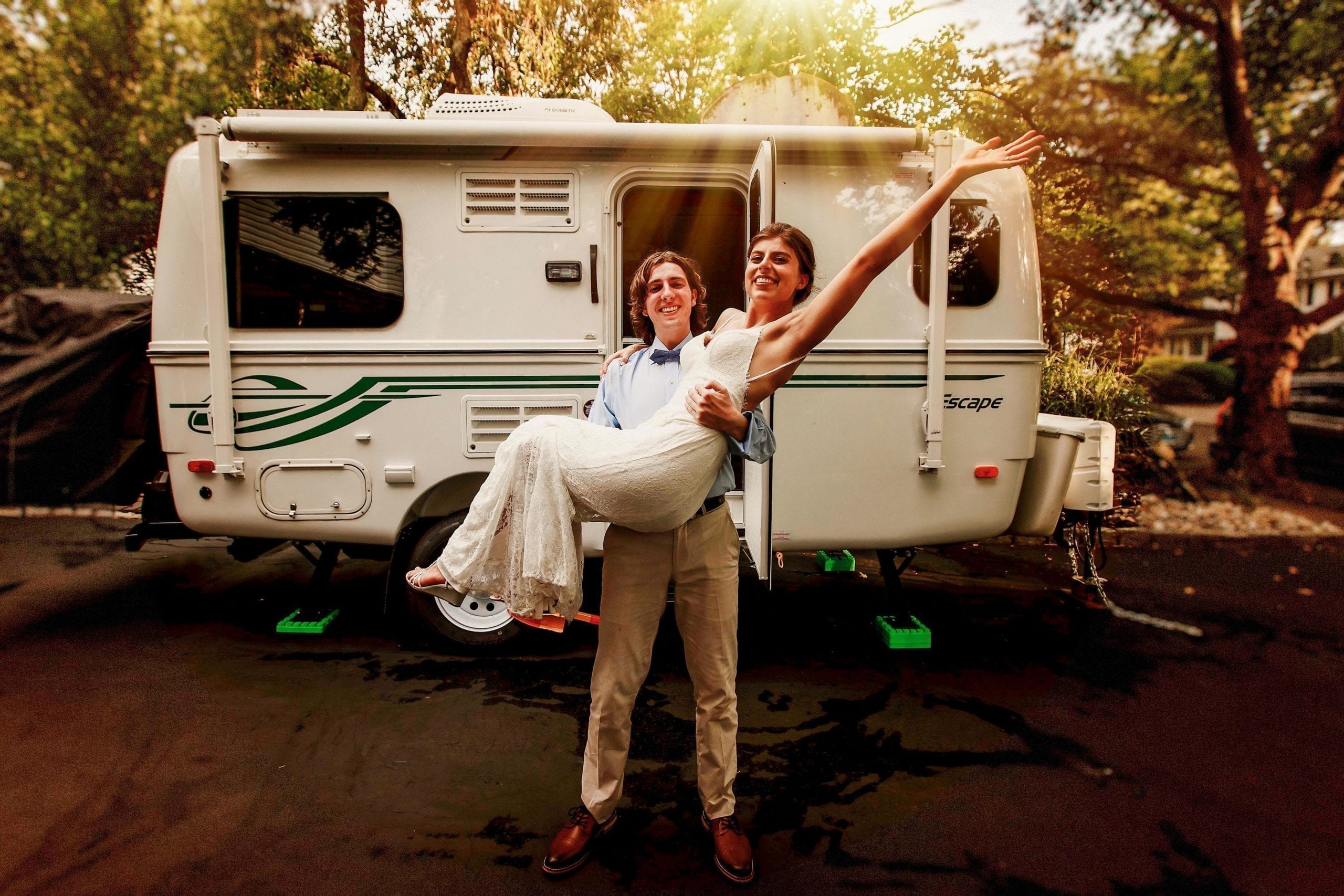
What You Need to Know About RV Insurance
You will be required to ensure your RV to meet your local requirements. These are likely to be liability and collision, but there are some coverages that can come in handy when you’re on the road.
Comprehensive Coverages: Many insurance coverages offer comprehensive policies that will kick in for out-of-the-ordinary issues like hail damage, vandalism, or colliding with a deer.
Collision Coverage: Most policies will cover the repair or replacement of your RV should you get into an accident.
Other coverage options you may want to look into:
- Roadside Assistance: Whether you get a flat or run out of fuel, roadside assistance can turn a stressful situation into just a speed bump. Roadside assistance insurance will provide you with services that will deliver fuel roadside, tow your RV to a mechanic, or bring you a battery.
- Emergency Coverage: Because your RV is your abode, you may want to consider adding emergency coverage to the policy. This will pay for a hotel should you break down. If you decide emergency coverage is not for you, be sure you have emergency funds set aside should the unexpected event occur.
- Personal Property: Your RV is your home. Should something awful occur and someone steals from your RV, these policies will replace them or pay to have them replaced.
- Full-Time Liability: These policies have additional coverages for people that call their RV their home. This will cover if someone is injured while in or by your RV. For example, if someone slips or trips walking down the steps and injures themself.
Be sure your vehicle is also covered for liability and your vehicle’s coverages work for your needs on the road.
What About Health Insurance on the Road?
Health insurance as an RVer comes with its own special considerations. First, be sure the policy you choose covers all the locations you plan to explore. If you’re planning to stay put in one state for a while, this may not matter. But if you’re planning to explore the country, this could present an issue.
Most policies will cover emergency care, no matter where you are. Some policies offer out-of-network prices when you’re out-of-state. Of course, you can always schedule your annual checkups for when you’re in your home state. In fact, it’s a great idea to schedule a physical and other annual exams before you hit the road.
Apps to Make Life on the Road Easier. Smartphones have changed the way we live—they have also made RV life easier. What apps should you check out?
Roadtrippers: Plan your entire trip, including stops—all in one spot.
- AllTrails: If you love hiking, trail biking, or looking for waterfalls, this app has over 100,000 trail maps and filters to help you find the type of trail you’re interested in. It will also record your hikes, so you can map your past adventures and make notes on which hiking spots you want to return to.
- Google Maps: Not only will you not get lost as long as you have reception, but you can also find alternate routes around traffic, add stops on your route, and find backroads for a more scenic view.
- Spotify, Prime Music, or Pandora: Don’t go without tunes. You can also pick up a waterproof bluetooth speaker to clip onto your hiking bag to make enjoying music easier wherever you may go.
- GasBuddy and Fuel Buddy: GasBuddy allows you to compare fuel prices at different gas stations while Fuel Buddy allows you to record your fuel expenses as you go.
- Amazon Kindle: Never run out of reading material. Airbnb: Find places to park or take a break from the road.
- iExit: If you’re looking for a spot to shop, grab a bite to eat, or get gas, this app allows you to see what’s coming up at your next interstate exit.
- Google Podcasts or Podcast Republic: Listen to your favorite podcasts and stay informed on current news.
- Your banking app: Keep up-to-date on your finances while on the road.
- Gaming apps: Anything you play at home can be brought on the road, like Sudoku or Words with Friend
Before Setting Out on the Road
Purchase a weekly or monthly planner. This will come in handy when it comes to keeping track of your fuel efficiency, maintenance schedule, camp locations, pace, medications, appointments, and more. Once you retire and hit the road, your days may also begin to blend together, a planner will help you stay on track (if you want to).
It’s a good idea to check cell phone coverage maps to decide on your route or to prepare accordingly. It’s always a good idea to have a physical map and that you double check your route before heading out.
A test run is an invaluable practice. Take your travel trailer to a local campsite for a few nights before you go on a longer journey. This will help your troubleshoot issues that could be avoided before you’re hundreds or thousands of miles away.
Remember to pace your travel. Driving while drowsy can be disastrous. No destination is worth putting your life or safety at risk.
Bring and buy what you can from typical stores rather than gas station convenience stores. Household items like toilet paper and daily staples like coffee can be more than twice the price at these roadside stops.
You can also save money by bringing washable dishes rather than using paper or styrofoam plates. It’s a good idea to bring some disposable dishes along for your trip for convenience, though. When stopping for a quick meal, you may not want to worry about doing dishes.
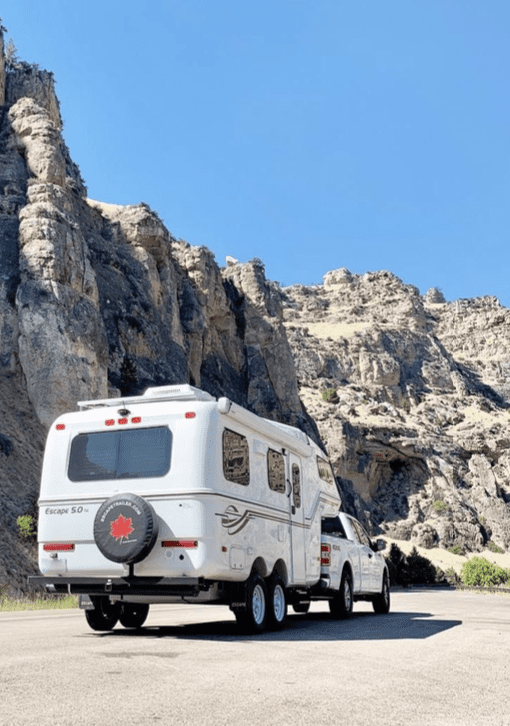
RV Safety Tips & Advice for Travelers
How to Plan for Accidents on the Road
One of the biggest concerns for full-time RVers is, “What happens if you break down?”
Breakdowns can be quite stressful, especially if you’re not prepared. If you should get a flat or suffer another type of accident, do your best to stay calm. Try to maneuver your rig safely out of traffic. The right shoulder of a freeway is always safer than the left. If your trailer and vehicle are in the line of traffic, you will want to wait until traffic is clear, exit your vehicle, and stand as far enough away as possible. This way, if a passing vehicle were to swerve around or accidentally collide with your vehicle, you and your passengers will be out of the line of danger.
If you have a roadside assistance service, like AAA, give them a call immediately. Your roadside assistance will ensure you will receive expedited help and often cover the cost. For RV owners without roadside assistance, you will want to use your smartphone to look up a towing company and the nearest mechanic. It’s always smart to call and get quotes and time estimates from multiple tow companies.
Additionally, you will want to call the mechanic before heading their way. Having your owner’s manual on-hand is also a safety must.
Choose a Recreational Vehicle with a Warranty
When shopping for your RV, always do your research on which companies offer manufacturer’s warranties. This is a sign of credibility and that the company will stand behind their product, even after you tow it off the lot. Furthermore, this protects your future budget from repairs and the price of parts.
Manufacturer’s warranties can cover your RV for one to three years depending on the brand. As the name implies, these warranties protect against any defects in the parts or fabrication. They do not cover issues that arise from neglect of regular maintenance, so be sure you always keep up with seasonal and regular maintenance.
Ultimately, a manufacturer’s warranty provides peace of mind that you are buying a quality trailer from a reputable company that cares about their product beyond the initial sale. This is a big purchase after all. Your trailer is your home on the road. Choose a brand that will support you as a new RV owner and ensures the quality of your trailer’s parts and build.
Escape Trailers stands behind the quality and durability of our travel trailers. We offer a Manufacturer’s Limited 2-year Warranty that covers defective materials or workmanship on all components manufactured and installed by Escape. This includes the fiberglass shell and all the interior framing and cabinetry. Installed components (air conditioning, stoves/cooktops, fridge, axles, tires etc.) are covered by the individual manufacturer’s warranties. We also offer lifetime customer support on any issue you have with your trailer through our after sales department.
The benefits of dealing with a smaller customer centric manufacturer are many. Our trailers are not mass-produced. Each trailer that goes through our assembly line is unique. This allows a more hands-on approach throughout our manufacturing process. Because we sell direct to customers, you get to see the process through photos and videos during the build process. This ensures your trailer is just as you ordered it and there will be no surprises on delivery day. If issues do come up after delivery, we are quick to respond and happy to help repair the problem or guide you to a repair center to get you back on the road as soon as possible.
How to Pack Your Camper
It’s better to put about 60% of your cargo weight toward the front of the travel trailer and the remaining 40% in the back half of the trailer. This weight distribution allows for optimal control of your trailer by reducing the risk of a sway backend or tipping your trailer upward.
If you don’t need it, leave it. When packing your camper, be mindful of whether or not you need every item you packed. If you can make do without it, consider leaving it home.
Map Your Route
Before your foot touches the gas pedal, know where you’re going. This can make anticipating turns or tricky areas to drive.
Slow and Steady Wins the Race
Whether you’re going on the highway or backroads, you want to keep your speed low. The weight and size of a trailer makes your vehicle less maneuverable and increases your stopping distance. Never exceed the speed limit.
Keeping a steady speed will also let drivers around you be able to predict your speed and safely pass if necessary.
Always use your turn signals and check that they’re working before you leave.
Parking Can Be Tricky
The first trick to parking a travel trailer is to not rush and to assess the parking lot and space before pulling in. You will usually find more room to park further from the entrance of businesses.
Pulling through to park and being able to pull out will make parking much easier. Parking garages can be more difficult than any other parking situation. Avoid them if you can.
Adding a backup camera to your RV can make maneuvering a lot easier and safer.
Other Tips
- Always be mindful of your height clearance. You likely will not fit under every drive through awning.
- Practice backing up your trailer before beginning your trip. Going slow will help. If you feel your trailer is going at too steep of an angle, stop, and pull forward to straighten out. If you wind up in too tight of an angle, you may jackknife and get stuck or break your tow hitch.
- Safety chains can save lives. Should your trailer come loose, tow chains will keep your camper attached to your vehicle.
- Don’t drive tired. Pull over and sleep if you feel sleepy.
- Never leave valuables within sight when you go into a gas station, restaurant, or rest stops.
Living RV Life to Its Fullest
Staying Fit and Healthy on the Road
Many aspects of RV life come with the benefit of improved health: less stress, more opportunities to hike, swim, bike, and increased Vitamin D.
Staying active while on the road is vital to making the most of a road trip or full- time RV living. When planning your trip, keep in mind the reason you invested in an RV and hold yourself accountable to living a healthy lifestyle.
Exercise
When it comes to staying in shape, nature and adventure are the best gyms an RVer could ask for. When planning your trip, look for opportunities to elevate your heart rate and get a dose of fresh air.
Activities
Now is the time to try new activities. Whether you’re exploring the country or a nearby county consider:
Kayaking
Hiking
Running
Trail Running
Jogging
Boogie Boarding
Wakeboarding
Stand Up Paddle Boarding
Low Impact Activities
Biking
» Bike Pump that attaches to your bicycleSwimming
» Mask and Snorkel, FinsYoga
» Mat, Blocks, StrapsTai Chi
Golfing
Skiing
Horseshoes
Equipment
Aside from the obvious, consider investing in the following gear to stay fit and safe while doing so:
First aid kit
Comfortable and supportive shoes
Knee and elbow pads
Helmet
Walking poles
Paddles
Life jackets
Camelback—for hydration
Sunblock
Bad Weather Options
Before setting out for some sunshine and exercise, be sure to check the weather. There will be days that are not ideal for outdoor activities. You can still get in a workout despite the weather though. Consider:
Joining a gym with locations and access throughout the country or plan to stop at an RV resort with a community fitness center.
Choosing a yoga routine that isolates the arms or legs.
Lifting hand weights or doing bodyweight exercises.
Some libraries offer free indoor fitness classes—check the libraries in your area for these opportunities.
Maintaining Regular Exams and Knowing Where to Go Should the Need Arise
Telemed appointments are an excellent option when your healthcare providers are thousands of miles away.
When mapping out your route, locate walk-in clinics nearby in case a medical issue comes up. If you call ahead, urgent care centers will tell you the cost of care and if they can meet your needs. They can also direct you to the nearest emergency hospital.
Medication and Prescriptions
Always keep a physical copy of prescriptions on-hand, including pet prescriptions. These can be extremely important should you need emergency medical care or you find yourself in an area without a pharmacy you regularly use.
Turn off auto-refills for your prescriptions. Otherwise, your meds will end up being filled at your home pharmacy.
Stay vigilant about your monthly or weekly planner prescription refill dates, giving yourself plenty of buffer time to call in your prescription refills. Most pharmacies need several days to fill a prescription, sometimes longer if they’re short on a particular medication. You can even plan to stop a bit longer when prescriptions are due for their refills. Choose a location that has a lot of different sights and sites you want to check out.
Using a national chain can make refills easier when you’re traveling, and many doctors will write your prescriptions for larger quantities if you let them know you’re traveling. Keep in mind that most health care plans and insurance plans may not let you fill more than a month at a time.
Non-Prescription Medications
It’s a good idea to keep some medications on-hand as you travel. Especially if you’re hitting the road full-time. You may want to bring: allergy medicine, cold medicine, cough drops, digestive aids, antibacterial cream, and bandages.
Storing Your Medications
Using a pillbox with the days of the week marked can help you stay on track with your daily medications. It also keeps them in an easy to access place if you’re on the road.
Try to keep your prescriptions and medicines (not including those in your pillbox) in their original containers. Using a marker you can color-code your bottles to make finding certain medications easier.
Store your medications in an air-tight bin in an area that does not get too hot. Try to avoid storing your meds in any area that may wind up wet. Keeping a cotton ball at the top of your pill bottles can wick away moisture.
Never leave your medications out or within view when stopping at a rest stop or for gas.
Spending Time with Your Spouse
Your spouse is likely your best friend. Having your best friend by your side on the road is an enriching experience that can strengthen your bond and reignite the passion in your relationship. On the other hand, tight spaces can also magnify pet peeves.
To make the most of time with your spouse, you will want to work on a few things:
- Communication: Setting ground rules for communication can prevent conflict. Be sure you talk to your spouse about asking for help, what topics should be conversations versus one partner making the decision without consultation (for example, you may not need to discuss every pitstop), and how to discuss issues when they arise.
- Neither you or your spouse are mind readers. Talk about what you want and need.
- Remember to communicate your appreciation and admiration for your spouse. Many people tend to voice the negative more often than the positive, but sharing what you love about your spouse will keep your bond strong.
- Be encouraging. Two are stronger than one and your encouragement can uplift your partner when they’re struggling, whether it be kayaking in white waters or juggling too many hot dogs on the grill.
Personal Time and Space: Most couples appreciate a little time apart. Be sure to schedule time for yourself. This may be a yoga session, walking the dog, or even a morning stroll. This time will give you a chance to ground yourself and reflect.
Compromise and Perspective: Should a difference in opinions occur, try to find a compromise while keeping in mind that many choices are rather inconsequential in the greater scheme of things.
Make Time for Romance: You’re choosing a simpler life to be able to focus on the more important things–what could be more important than your life partner? Celebrate one another with date nights, quality time, or a romantic evening in.
Grow and Learn Together: Partaking in an adventure will bring you and your spouse closer together than ever before.
What to Consider When Traveling with Kids
Life on the road is one of the best experiences for children and grandchildren. Seeing the great outdoors and what North America has to offer is an opportunity that most kids will only have once time in their lives and will provide memories that will last forever.
Games & Equipment
Of course, kids can get bored once the sun sets or when they lose their phone signal. Preparing for these moments ahead of time can make a huge difference for the entire family. To mediate boredom, plan to pack some of the following:
• Board games like Sorry!, Checkers, and Scrabble
• Coloring books • Books
• Walkie talkies
Packing
If your children or grandchildren are joining you for part of your journey, but are not old enough to pack (or old enough to pack well), you will want to take the items below into account.
Kids require just as much baggage as adults, even though their clothes are often smaller. When packing for your little ones, always prepare extra outfits since kids tend to embrace mud, dirt, and water a bit more readily than adults.
Toiletries
Toys and stuffed animals
Extra blank paper and crafts supplies
School work
Medication (include cold medicine, kids’ aspirin, digestive aids)
Snacks & drinks
Education on Wheels
Many children living on the road are homeschooled (often referred to as “roadschooled”) or enrolled in virtual school. Be mindful of protecting quiet time to help kids concentrate better. They will also need a space to spread out their books, laptop, papers, and
a mini dry erase board. You will also want to plan for storage room for school materials—a great thing to discuss when deciding on your RV personalizations.
Be prepared to set aside time to work with your kids on their schoolwork, too.
If your children need additional help, virtual tutors can make a world of difference.
Check out libraries for learning activities and socializing opportunities for your kids, too. You can also investigate activities at zoos, museums, and parks.
We also recommend long-term projects for little Escapers like photo journaling their expedition and experiences.
Safety Tips for Parents
Keeping your children safe on the road is a priority. Before pulling the parking brake and setting off, be sure you’re prepared to protect your little ones from whatever may arise.
Talk to your kids about road safety. Remind them not to stray too far, talk to strangers, or walk into the parking lot or across the road without checking both ways (or being accompanied by an adult).
Always have a plan for if you’re separated or one of your kids becomes lost. Even if your children have cell phones, you may be in an area with no reception.
Safety Tips for Parents
Keeping your children safe on the road is a priority. Before pulling the parking brake and setting off, be sure you’re prepared to protect your little ones from whatever may arise.
Talk to your kids about road safety. Remind them not to stray too far, talk to strangers, or walk into the parking lot or across the road without checking both ways (or being accompanied by an adult).
Always have a plan for if you’re separated or one of your kids becomes lost. Even if your children have cell phones, you may be in an area with no reception.
Meet the Escapers
Danika, Chris, and young Will are a recent addition to the Escape family. They were lucky to find a pre-owned Escape 19 during the early stages of pandemic and haven’t looked back.
With a summer spent exploring around their home province of BC, they fell in love with their home-away- from-home. Danika explains, “We are a family of three plus a big Rhodesian Ridgeback. Having a camper that meets all your needs makes exploring with young kids totally accessible. We love it. Our 2 year old just started saying “adventure!” when we pull out for another road trip!”
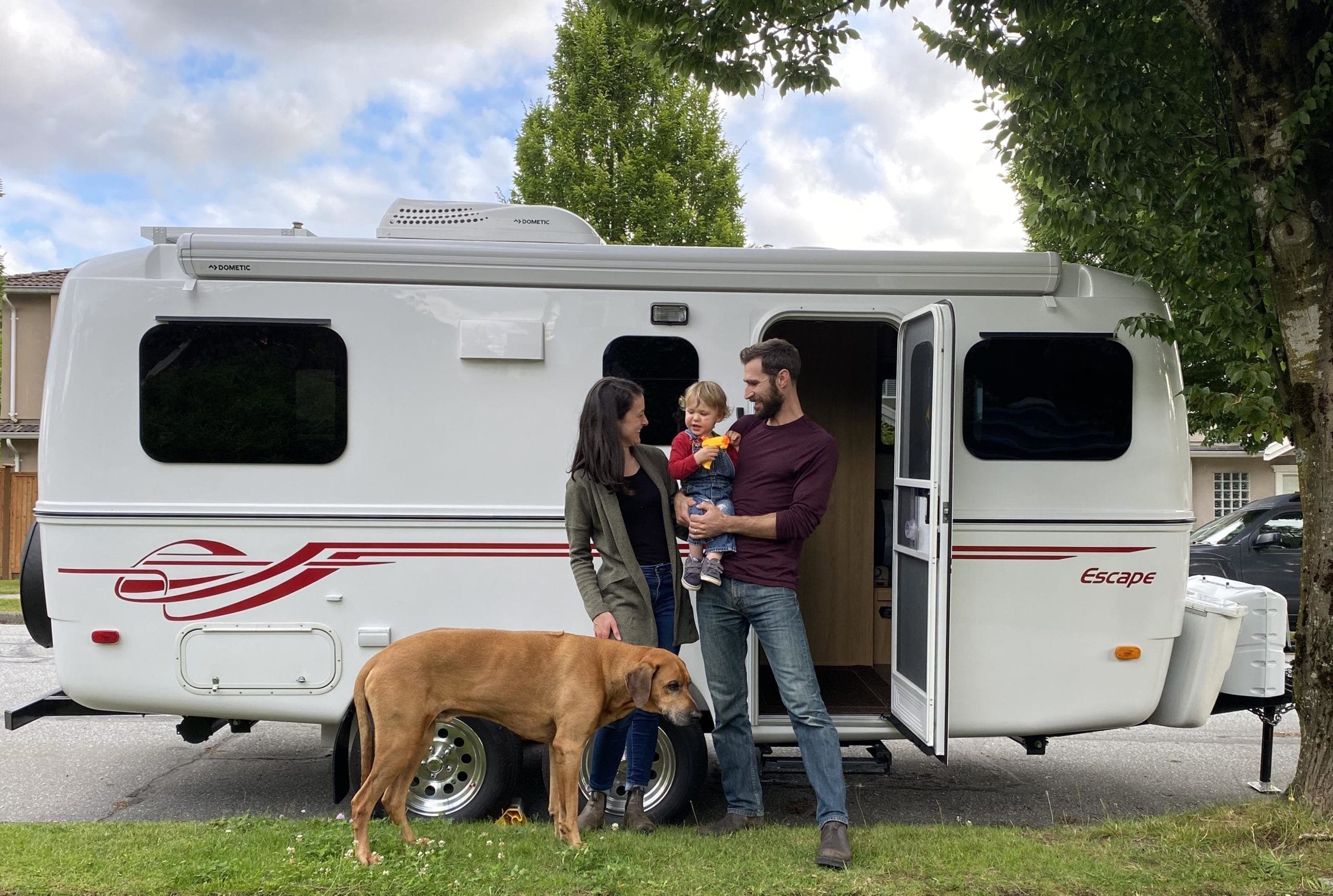
Special Considerations for RV Retirees
Using Senior Discounts
You’re in your golden years. You’ve earned the freedom of the road. You also deserve some additional perks like all the discounts available to you, so be sure to take advantage of them. Over time, discounts add up to quite a bit of saving, allowing you to experience more for less.
Some of the most popular and useful discounts for Senior RVers include Federal National Parks Senior Pass and discounts offered to AARP members.
Many recreational activities also offer senior discounts. So, if you’re planning to go to any museums, movie theaters, golf courses, or parks be sure to check out their website or call ahead and ask. Many RV parks and campsites also offer senior discounts.
Restaurants (including fast food) often have senior discounts or AARP discounts. You may also want to consider joining a fuel club or some discount clubs for places where you shop often like Kroger.
Always ask before ordering if a location offers a discount and what the details are. It can’t hurt to possibly save money!
Adapting to the Physicality of RV Life
RVs offer comfort and freedom, but your home-on-wheels will come with upkeep that can be physical at times. Staying in shape can be easy once you begin hiking, kayaking, and biking. Yet when you first start out, you will want to be sure that you or your spouse can keep up with these tasks that require a bit of muscle.
Choose an RV that will hold up well to the elements and won’t leave you high-and-dry roadside, and you will find that the tasks become easier with time. As for adapting to RV life, you will want to practice some of these before departure.
Frequent Tasks
• Setting up outdoor furniture
• Raising and lowering jacks
• Leveling your rig
• Packing and unpacking
• Lifting and lowering your antenna
Monthly Tasks
• Check your engine, hoses and fluid levels
• Measure tire pressure (more often depending on your itinerary)
• Survey the exterior of your travel trailer, including the undercarriage, roof, and moisture seals
• Tank maintenance
Seasonal Tasks
• A deep and thorough clean
• Winterize your RV
• Wash and wax the RV
• Check water filters and air filters
• Check your HVAC system
Plan Ahead if Purchasing an RV
Before purchasing an RV, make an appointment with your doctor. A physical and reaction-time check can give you peace of mind that you are capable of caring for your RV and keeping your family safe on the road. You also don’t want to find out that you will need regular visits to the doctor when you’re far from your primary care provider.











